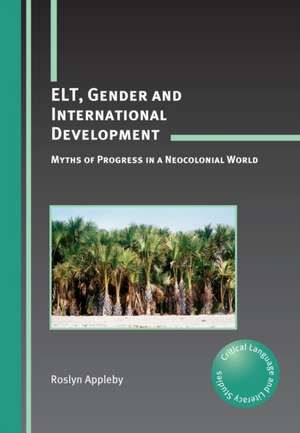ELT, Gender and International Development: Critical Language and Literacy Studies
Autor Roslyn Applebyen Limba Engleză Paperback – 3 aug 2010
| Toate formatele și edițiile | Preț | Express |
|---|---|---|
| Paperback (1) | 259.47 lei 6-8 săpt. | |
| MULTILINGUAL MATTERS – 3 aug 2010 | 259.47 lei 6-8 săpt. | |
| Hardback (1) | 720.58 lei 6-8 săpt. | |
| Channel View Publications Ltd – 2 aug 2010 | 720.58 lei 6-8 săpt. |
Din seria Critical Language and Literacy Studies
-
 Preț: 191.10 lei
Preț: 191.10 lei -
 Preț: 229.33 lei
Preț: 229.33 lei -
 Preț: 273.59 lei
Preț: 273.59 lei -
 Preț: 272.75 lei
Preț: 272.75 lei -
 Preț: 272.85 lei
Preț: 272.85 lei -
 Preț: 143.54 lei
Preț: 143.54 lei -
 Preț: 255.57 lei
Preț: 255.57 lei -
 Preț: 295.45 lei
Preț: 295.45 lei -
 Preț: 255.78 lei
Preț: 255.78 lei -
 Preț: 296.79 lei
Preț: 296.79 lei -
 Preț: 292.55 lei
Preț: 292.55 lei -
 Preț: 291.57 lei
Preț: 291.57 lei -
 Preț: 254.64 lei
Preț: 254.64 lei -
 Preț: 256.75 lei
Preț: 256.75 lei -
 Preț: 261.77 lei
Preț: 261.77 lei -
 Preț: 291.57 lei
Preț: 291.57 lei -
 Preț: 261.38 lei
Preț: 261.38 lei -
 Preț: 254.64 lei
Preț: 254.64 lei -
 Preț: 256.55 lei
Preț: 256.55 lei -
 Preț: 291.78 lei
Preț: 291.78 lei -
 Preț: 258.50 lei
Preț: 258.50 lei -
 Preț: 254.64 lei
Preț: 254.64 lei -
 Preț: 371.56 lei
Preț: 371.56 lei -
 Preț: 292.16 lei
Preț: 292.16 lei - 24%
 Preț: 162.99 lei
Preț: 162.99 lei - 14%
 Preț: 198.85 lei
Preț: 198.85 lei
Preț: 259.47 lei
Nou
Puncte Express: 389
Preț estimativ în valută:
49.65€ • 51.53$ • 41.50£
49.65€ • 51.53$ • 41.50£
Carte tipărită la comandă
Livrare economică 15-29 martie
Preluare comenzi: 021 569.72.76
Specificații
ISBN-13: 9781847693037
ISBN-10: 1847693032
Pagini: 260
Ilustrații: illustrations
Dimensiuni: 148 x 210 x 14 mm
Greutate: 0.34 kg
Editura: MULTILINGUAL MATTERS
Seria Critical Language and Literacy Studies
ISBN-10: 1847693032
Pagini: 260
Ilustrații: illustrations
Dimensiuni: 148 x 210 x 14 mm
Greutate: 0.34 kg
Editura: MULTILINGUAL MATTERS
Seria Critical Language and Literacy Studies
Cuprins
Introduction: This is where it crashed and burnedPart I Understanding English language teaching in development 1 Models of development and English language teaching 2 Time and space in English language teaching, gender and development 3 Spatial context: East Timor, Indonesia and AustraliaPart II Teachers' narrative accounts 4 Being there: Teachers' spatial engagements with development contexts 5 It's a bubble: English language teaching practices in development 6 Doing the washing up: Teaching and gender in developmentConclusion: Spatial practices in the contact zone
Recenzii
The book's focus on gender relations in development contexts, its superb deconstruction of aid agencies in situ, the gendered space of ELT classrooms and the voices of ELT teachers working in development contexts is unique. This book should be read not only by sociolinguists, sociologists, critical theorists and theorists of development working in the academy but also NGOs and aid agencies working in post-trauma societies. There is much to be learned here.Naz Rassool, The University of Reading, UKThis book presents a penetrating analysis of teachers' narratives about their everyday experiences of English language teaching (ELT) in international aid programmes in East Timor and Indonesia. Starting from these narratives, the author interrogates the social and cultural significance of ELT in such contexts and unpacks some of the discourses and practices that produce gendered subjectivities in international aid projects. The book is a very welcome contribution to the all-too-sparse literature on language in development.Marilyn Martin-Jones, Director, MOSAIC Centre for Research on Multilingualism, University of Birmingham, UKAppleby's book is well theorised and well written, presenting vivid, intriguing and engaging accounts of white women language teachers in development contexts, not so much as 'agents of change', but rather as participants in a complex process where multiple trajectories andshifting identities play out in language teaching practice. Overall, many will find this book extremely instrumental in understanding the complex nature of ELT as a contact zone between multiple cultures and communities, not as an apolitical, ahistorical and autonomous enterprise.Hye-sun Cho, University of Kansas, USA in Language and Education, Vol. 25, No. 3, May 2011, 257-266The overall impact of the book is that of a much-needed resource to provoke deeper thought about the three issues - ELT, gender and development aid - which it addresses. This is a book that informs deeply about the aid context in general, about the need for locally responsive ELT practices, and about gender in the aid context. However it does more than that. In offering ways to rethink the interplay between space and time, Appleby effectively contributes to long-running debates about context in English language teaching. Additionally, through the insights it offers on the experiences of women teachers in ELT aid contexts, both as teachers and as women, the book also has the potential to 'teach' those of us who may never have considered the political aspects of ELT, gender and aid. It is a book which should be read by all who are responsible for ELT aid programs, by those who teach on aid programs, by anyone interested in issues of language planning and above all, byanyone interested in asking "what would a decolonized, dewhitened, postcolonial English language teaching actually look like?"Constance Ellwood, The University of Melbourne in Australian Review of Applied Linguistics 2011 34, 2.
Descriere
Descriere de la o altă ediție sau format:
This book draws on the narratives of white women as English language teachers in the neocolonial world of international development. It explores the paradoxes of language as aid, and questions the mythical power of English to deliver on the promises of a brighter future for the developing world.
This book draws on the narratives of white women as English language teachers in the neocolonial world of international development. It explores the paradoxes of language as aid, and questions the mythical power of English to deliver on the promises of a brighter future for the developing world.









